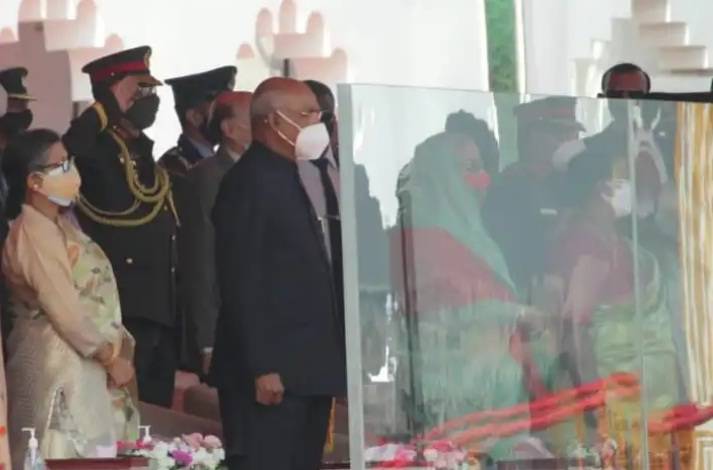According to the World Bank, seamless transport connectivity between India and Bangladesh has the potential to increase national income by as much as 17 per cent in Bangladesh and 8 per cent in India…reports Mahua Venkatesh and Sumi Khan
Amid celebrations marking December 16 — Vijay Diwas — not just for Bangladesh but also for India, the two neighbours reiterated the need to work closely on issues relating to connectivity and economic co-operation.
Prime Minister Narendra Modi who earlier described Bangladesh as a “soho jatri” or a co-traveller, tweeted, “On the 50th Vijay Diwas, I recall the great valour and sacrifice by the Muktijoddhas, Biranganas and bravehearts of the Indian Armed Forces. Together we fought and defeated oppressive forces. He added that President Ram Nath Kovind’s presence in Dhaka to be part of the celebrations honouring 50 years of independence “is of special significance to every Indian.”
“The future of India and Bangladesh are tied and intertwined with each other,” Ishfaq Ilahi Choudhury, who served as air commodore in Bangladesh’s Air Force said.
The focus for the governments of both countries has been on a host of bilateral issues relating primarily to connectivity including resuming transboundary rail links and opening up inland waterways which would in turn boost trade. Analysts said that these initiatives need to be formalised and concluded at the earliest.
According to the World Bank, seamless transport connectivity between India and Bangladesh has the potential to increase national income by as much as 17 per cent in Bangladesh and 8 per cent in India.
Future relationship between the two countries that share a 4,096-kilometre-long border have to be based in mutual understanding and progress. “Ours is a joint celebration,” Bipul Chatterjee, Executive Director, CUTS International told India Narrative. “It has to be a two-way process and a win-win for both nations, for India to prosper economically and socially, Bangladesh has to be taken on board and vice versa,” he added
In 2020, India and Bangladesh resumed rail services between Haldibari in West Bengal and Chilahati located across the border after 55 years.
The two countries are looking at starting train services between Agartala in India and Akhaura, Gede (India), Darshana, Singhabad (India)-Rohanpur (Bangladesh), Radhikapur (India)-Birol (Bangladesh). Besides, connectivity through waterways is also on the cards.
A boost in rail and road links between India and Bangladesh will not only enhance bilateral ties but will also enhance connectivity for New Delhi with the north-eastern part while reducing emerging geopolitical vulnerabilities for both nations.
Besides connectivity, a trade agreement between the two is also expected to be signed. The World Bank report revealed that in East Asian and Sub-Saharan African economies, intraregional trade accounts for 50 per cent and 22 per cent of total trade, respectively. “In fact, it is about 15-20 per cent less expensive for a company in India to trade with a company in Brazil or Germany than with a company in Bangladesh,” the report said.
‘Inspired by Bangabandhu’s courage’
Visiting Indian President Ram Nath Kovind said here that as a youth, he was inspired by the “moral courage” of Bangabandhu Sheikh Mujibur Rahman, Bangladesh’s Father of the Nation, to liberate the country from an oppressive regime 50 years ago.
Bangladesh on Thursday celebrated its Golden Jubilee of Independence with a Victory Day parade in which President M. Abdul Hamid and his Indian counterpart Kovind were present along with Prime Minister Sheikh Hasina.
Addressing the celebrations, the Indian President said: “Like millions of others, I was electrified by his (Bangabondhu) powerful voice, and the understanding that it carried the aspirations of 70 million people of Bangladesh at that time. Like millions of Indians of my generation, we were elated by the victory of Bangladesh over an oppressive regime and were deeply inspired by the faith and courage of the people of Bangladesh.
“Fifty years ago, the vision of an independent Bangladesh inspired millions. But it seemed a remote and impossible dream then to naysayers, sceptics and detractors. The international context and realpolitik seemed to rule out the prospects of Liberation. Set against a brutal, determined, and well-armed foe who would stop at nothing, the odds were very much against Bangladesh.
“But the inspiring statesmanship of Bangabandhu; his clear-sighted moral conviction and his unflinching determination to seek justice for the people of East Pakistan were truly the game-changers. As a result, the world learnt a valuable lesson: that the will of the majority of people cannot be subjugated by any force, however brutal.”
He added that although Bangabandhu and his family members were brutally killed, the anti-liberation forces failed to realise that bullets and violence cannot extinguish an idea that had captured the imagination of the millions of people
Kovind further mentioned that the anti-liberation forces did not count on the determination and resilience of Sheikh Hasina, the incumbent Prime Minister who has faced assassination attempts and dictatorships with remarkable courage.
“She has been driven by the strong conviction to realise the dream of Bangabandhu, and his spirit of the ‘Bidrohi’ (or rebel).”
During the occasion, President Kovind paid tributes to the memory of the untold suffering of tens of millions of people of Bangladesh.
“It is their sacrifice, and the righteousness of the cause of Bangladesh, that has transformed the region. As our nations develop and our friendship further deepens, let us continue to work together towards realizing the dreams of our peoples.”
President Kovind said history will always bear witness to the “unique foundation” of friendship between India and Bangladesh, forged in the people’s war that liberated Bangladesh.

Leave a Reply